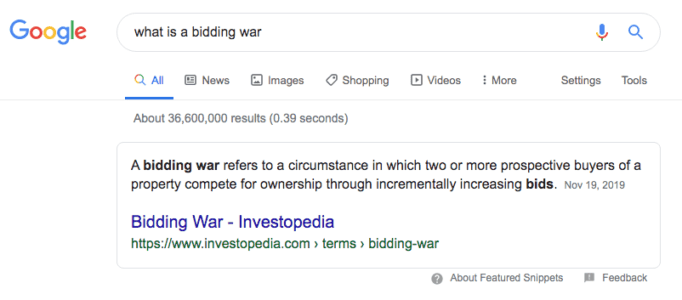In the world of SEO, “Zero Click” is becoming a bigger and bigger topic, and for good reason. Google says that 49% of all searches are now zero-click searches. But, what are zero-click searches, and why would a real estate agent even care about it?
Zero click searches are searches that are done that answer the searcher’s question without them actually clicking through to anything. Here’s an example:

As you can see, there’s no reason to click through to anything because the searcher’s answer was provided for them right there in the search results (zero clicks). The fact is that Google is making a big push towards encouraging these types of searches.
There are a lot of examples of when zero-click searches are useful besides checking the time: you can find out what time your favorite restaurant is open until, make a quick calculation, or find a definition; all without actually clicking through to a website.
As you can imagine, that’s a big deal for websites that rely on getting traffic on a daily basis. In fact, many of those websites have reported a direct correlation between zero-click searches and their website traffic going down.
But how does that affect you as a real estate agent? Why should you care? The fact is, your traffic may go down.
As an agent, and as a marketer, you really only have 2 options here. You can complain that Google is being evil and ruining the traffic you rely on, or you can adapt your marketing strategy and conform to what’s coming next. Here’s how:
Adapt Your SEO Strategy
Any professional company that is working on your overall SEO strategy already knows this is happening. In fact, they should be adapting your SEO strategy to work with it.
One way is to try to optimize your website for featured snippets. A lot of the zero-click searches are around the ‘what is…’ question, and as an agent, there’s a lot of opportunities to answer questions within your content and show up in a zero-click search result.
Here’s an example of a featured snippet in a search result for “what is a bidding war”:

As you can see, that featured snippet brought up a result that answered the question without you needing to click through. So how do you rank for these? For agents, the best opportunity is to rank for definitions and explanations (which a lot of agents write content about anyway).
Most featured snippets queries like this begin with: A ‘keywordphrase‘ is… so it makes sense to go through your existing content that answers these questions and structure them this way. If you have a post that answers what something is, like: ‘What is a bidding war’, then the first sentence of your post should be: ‘A bidding war is…’.
Ranking for zero-click searches is obviously a good thing as you’ll be at the top of the organic results. That said, it’s still possible that someone will click through if that snippet isn’t quite enough information for them.
Secondly, with Google understanding that zero-click searches are growing, results like these (along with a number of other factors) have the opportunity to rise to the top of the ranks in results.
So how you do mark your page as a featured snippet? You can’t. Here’s what Google has to say about it:

The only thing you can really do is follow best practices to ensure that your SEO strategy is continually evolving to take new search trends into account.
More and more, Google is making ranking on the first page for organic keywords extremely difficult. With Google’s first page of results now showing featured snippets, ads, and business and map results, the first few organic results are towards the bottom of the page.
That means that the results that used to appear on the first page have moved to the second (and progressively buried). There has never been a more important time to build your brand, ensure you rank correctly for name searches, and plan your organic search strategy in line with what will rank (and where it can rank).
With up to date marketing trends relevant to today’s market, our report is a selection of curated content, information, and data that will give you an outline of what’s working right now in real estate marketing.




